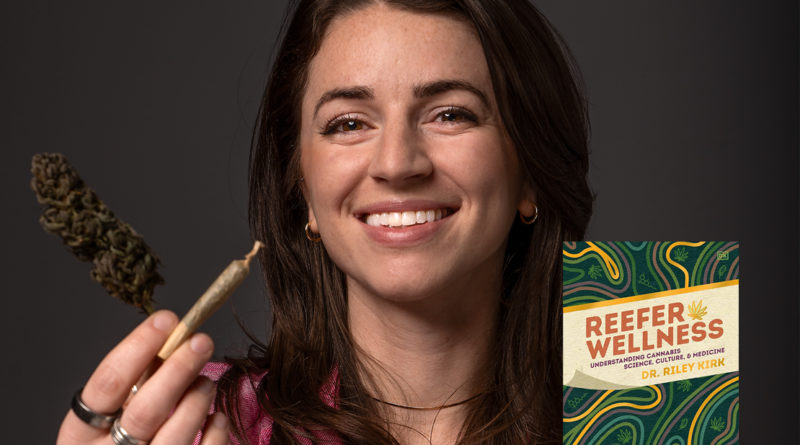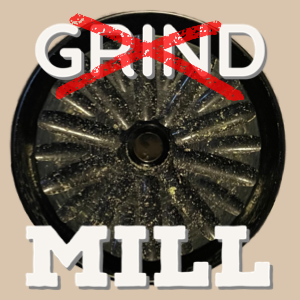Dr. Riley Kirk on how Reefer Wellness normalizes Cannabis science education
Dr. Riley Kirk (aka Cannabichem), Pharmaceutical Sciences PhD and co-founder of the Network of Applied Pharmacognosy has published a new Cannabis science communication book titled Reefer Wellness: Understanding Cannabis Science, Culture, and Medicine and The Highest Critic was able to do a quick interview with Dr. Kirk to help promote the launch. The book is available now! For those who don’t know because they might not be of a certain age, the name of the Reefer Wellness book is a direct response to a globally well known visual piece of American anti-cannabis propaganda from 1936, Reefer Madness.
In the following interview, I highlight the ethos behind this new book, the origins of its name, how it fits in with Dr. Kirk’s work with the Network of Applied Pharmacognosy, and even some random things I’ve just been wondering about Post-Prohibition Changes in Cannabis Genetics. Dr. Riley Kirk described why she felt Reefer Madness fell hilariously short with subsequent generations and how her book and work provide a new perspective which actually harkens back to bygone days where governments did not wage global wars on plants. The varying levels of Prohibition that have spread throughout the world since 1936 have stymied cannabis research, allowing the spread of myths and misinformation by the government, but also from within the cannabis culture. The lack of clear cannabis science communication has removed entire classes of cannabis products from our materia medica while creating new classes of products which do not contain whole-plant effects. To me, this interview highlights the real destigmatization and normalization work that science communicators like Dr. Kirk are championing both to other academics and also to the mainstream.
Without further ado, let’s hop to it.
Dr. Riley Kirk Reefer Wellness Interview
Caleb Chen: Tell me about the first time you saw Reefer Madness, and how the title of your new book came about?
Dr. Riley Kirk: I didn’t see the movie Reefer Madness until I was probably 20 to 25 years old, and I watched it with some college friends. I had heard references to it my whole life but didn’t know how to actually access the film. I expected it to be a serious and concerning take on cannabis, but in reality, it was unintentionally comedic, especially because almost all the “stoners” I knew at the time were studying to become academics, physicians, paramedics, or scientists. The film was clearly written as a fear-mongering tactic, but it was too late for our generation. We’d already been exposed to the plant for a decade or so, and it clearly wasn’t doing what the film claimed it would do to our lives.
I named the book Reefer Wellness to use science as a tool to reverse the stigma caused by Reefer Madness and put some positive propaganda into the world, showing cannabis as a tool
for wellness, not a drug of abuse.
Caleb Chen: How do you see the book fitting in with your work at the NAP?
Dr. Riley Kirk: The nonprofit I co-founded, The Network of Applied Pharmacognosy (NAP), has a mission of using science as advocacy. A significant amount of our work involves gathering data, publishing peer-reviewed papers, and communicating that information back to the cannabis community so we can all stay involved and up to date on cannabis research. That’s also one of the main goals of Reefer Wellness. There are over 30,000 scientific publications on cannabis and the endocannabinoid system, but what we’re missing is a reliable way to communicate that knowledge to consumers. I’m hoping this book becomes a tool for education, destigmatization, and harm reduction,and shows consumers just how much we actually know about cannabis science. It’s a lot.
Caleb Chen: What are your thoughts on cannabis secondary metabolites effects on receptors other than CB1 and CB2 receptors, ie GABA, TRPV
Dr. Riley Kirk: It’s well known that many compounds in cannabis interact with receptors beyond CB1 and CB2. While those are the most well-defined in cannabinoid science, they mostly tell the story of THC, which we know is not the full story. To understand strain-specific effects and why one person responds better to Haze while another prefers GMO, we have to expand our perspective on cannabis medicine. Cannabis contains hundreds of compounds, and they interact with hundreds of receptors throughout the body. It’s not a single cannon firing at the CB1 receptor, it’s a symphony of activation. I believe the next frontier in cannabis research lies in mapping these broader interactions and unlocking personalized medicine through cannabis.
Caleb Chen: What is the longest flowering cultivar that you’ve experienced?
Dr. Riley Kirk: The longest flowering cultivars I’ve grown are Lamb’s Bread and Acapulco Gold. I know there are others that take even longer, but I try to be realistic about what I can grow in the northern parts of New England, considering our climate. These cultivars were challenging, but it was amazing to see how diverse the phenotypes could be in these classic sativas.
Caleb Chen: Have you personally noticed any differences in the medicinal effects between longer flowering varieties and shorter flowering varieties? How about in the literature?
Dr. Riley Kirk: Absolutely. The differences generally stem from the plant’s genetics and where it originated. Longer-flowering varieties tend to come from tropical regions with gradual seasonal changes. These plants often produce more stimulating, creative, and energetic effects, what people commonly refer to as “sativa-like.” They tend to contain terpenes like terpinolene, ocimene, limonene, and pinene, and cannabinoids like THCV and CBG.
In contrast, short-flowering varieties often originate from mountainous regions with harsher seasonal changes. These are usually more sedating and calming, making them ideal for
nighttime or relaxation. They’re often rich in myrcene, linalool, and caryophyllene, and heavier in THC. These chemical differences align well with how these varieties are traditionally classified
and experienced.
Caleb Chen: What are your thoughts on the bottleneck of cannabis genetics in both legal and legacy markets?
Dr. Riley Kirk: While genetics isn’t my main area of expertise, I think much of the bottleneck in the legal market stems from a focus on profit over quality. With limited grow space, companies tend to favor fast-flowering, high-yielding varieties that are easy to flip for higher turnover, rather than investing in unique or long-flowering genetics that may offer more nuanced effects.
In the legacy market, I still see incredible flower, but even there, familiarity drives sales. People tend to buy what they recognize, which reinforces the popularity of certain strains and leads to
less diversity. It’s a cycle that prioritizes repetition over exploration.
Caleb Chen: Why does the average cannabis consumer need to care about whether their cannabis product is made using whole plant extract, or a single cannabinoid isolate?
Dr. Riley Kirk: Because whole-plant products generally work better,plain and simple. Consumers deserve to know whether they’re getting the full spectrum of compounds from the plant or just a lab-purified ingredient. It’s the responsibility of both manufacturers and consumers to care about what’s going into their bodies.
We talk a lot about the entourage effect, emphasizing how cannabis works best in its natural complexity. Yet many commercial products strip that complexity away. If consumers realized
how heavily processed some products are, especially things like gummies that often contain only THC, they might start asking more questions. Ironically, many people use cannabis to move
away from pharmaceuticals, not realizing their cannabis product may be just as isolated and processed.
Caleb Chen: What are your opinions on spray packs?
Dr. Riley Kirk: I think they’re unnecessary. I believe plants produce a “natural ratio” of compounds, what their genetics and environment allow them to make. When we start adding synthetic terpenes or cannabinoids post-harvest, we disrupt that natural ratio, which is where adverse effects can arise. If you can’t grow good weed with a good nose, you probably shouldn’t be growing it. Spray packs feel like a shortcut, and to me, they disrespect the plant and make the industry look less credible.
Caleb Chen: What is the next destigmatization milestone that you’re looking forward to?
Dr. Riley Kirk: More cannabis consumption spaces in legal states. It’s wild that we legalize cannabis but don’t provide public places to consume it. That’s like legalizing alcohol but not having bars. Cannabis consumers want social environments where they can share, relax, laugh, and engage,and those spaces should be included in every new legalization effort.
Caleb Chen: What do you think is the active ingredient in historical cannabis root preparations?
Dr. Riley Kirk: My best guess is that historical cannabis root preparations contained fatty acids, possibly similar to those found in cannabis seeds, as well as terpenes like friedelin. But the true activity may also have come from more complex factors, such as how the roots were prepared, the soil microbes involved, or the dose and delivery method used. There may be lost knowledge in
these traditional practices that we still haven’t fully rediscovered.
Thanks to Dr. Riley Kirk for the interview, and to Alice Moon for setting it up. I cherish the opportunity to help destigmatize and normalize cannabis science, and also ask my most random cannascience questions to the one and only cannabichem.
Reefer Wellness is not just a loud and proud, scientifically backed response to the endless stream of mythinformation, it is a definitive step towards closing off that stream and replacing it with insights verified by the fast reemerging world of cannabis research. As universities around the world stand up Cannabis Studies Programs (like the one at Vermont State), these are the types of books that are needed for the syllabus. This is science communication at its best. Every library needs a copy, every stoner’s coffee table and bookshelf needs one, too. That’s just my high recommendation :). If you aren’t a reader, get the audio book, and also check out Riley’s BioActive Podcast!
Amazon link to buy the book and support this website with an affiliate cut: https://amzn.to/4ke9bsJ [AFFILIATE LINK]
Featured image from NHCANN.
Founder of The Highest Critic
Unpaid /r/trees mod
Certified Ganjier
Kine bud enthusiast



